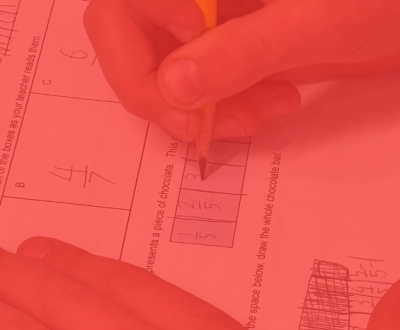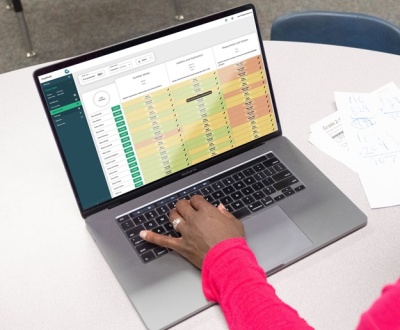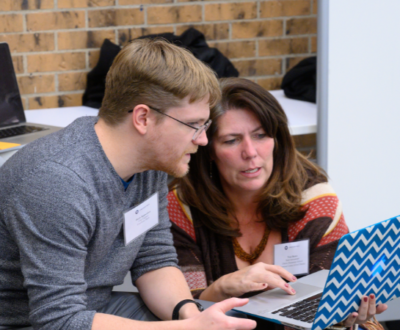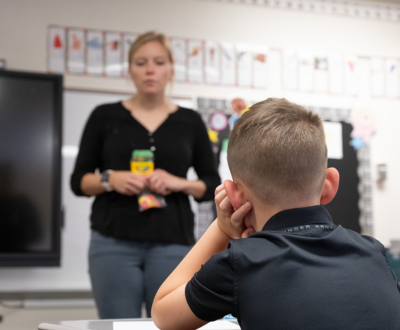4 Recommendations to Improve Your PLC Work
- January 24, 2020
- Blog
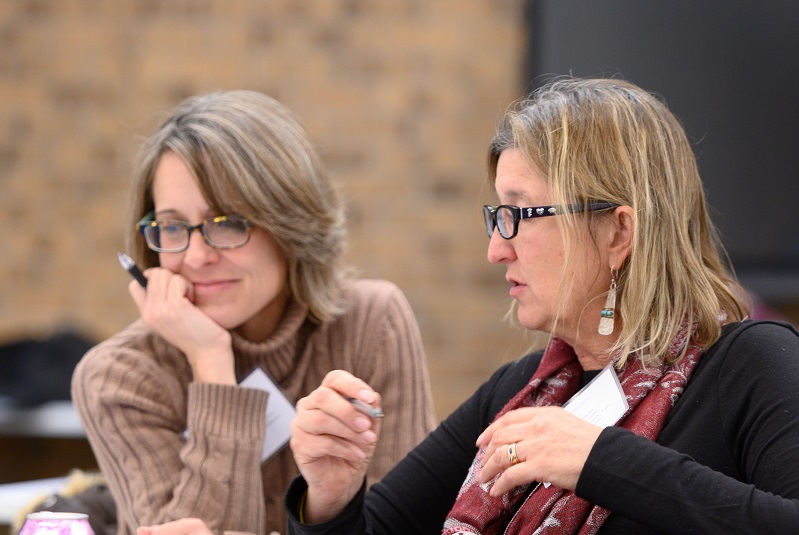
In recent years, so much of the work of interpreting student learning, setting goals, grouping students, and differentiating has been outsourced to publishers, assessment companies, and technology solutions. The PLC movement shifts the power dynamic: re-empowering teachers to improve instruction through a collaborative process directed by four critical questions. It is, ultimately, teachers that have the biggest impact on student learning. The PLC movement aims to support schools in ensuring the success of every student.
PLC Question #1: What do we expect our students to learn? → Help teachers deeply understand standards by reading and discussing them on a regular basis.
It would seem that the question, “What do we expect our students to learn?” has been answered for us by the creators of standards and district documents, but it is not so simple. Often times there are widespread misunderstandings of standards, and at other times, there is simply a lack of awareness. In other scenarios, teachers want to trust adopted curricular materials and expect that they are aligned with standards, but that is not always the case.
Teachers need to take the time to dig in deep enough into the standards to really understand them. When there is a renewal of the standards at the state or local level, districts will provide professional development for the teachers and leaders to become familiar with the standards, but these PD efforts ultimately fall short. This is why, at a true PLC, reading and discussing the standards on a regular basis is important. It adds focus to the conversations and provides a framework for discussing what we expect students to learn.
Question #2: How will we know when they are learning? → Give teachers time to reflect upon, study, and potentially modify current assessment tools, but do not expect them to create these from scratch.
This critical part of the process can be overly simple or overly complex: striking the right balance is important. In some scenarios, leaders and teachers will agree to accept curricular assessments without a second thought. This leads to consistency, assuming the scoring guide is decent, and reliability in grading. Unfortunately, it also means that the process of thinking about how we know when students learn does not happen. Teachers need to consciously agree on assessments and understand the assessments that they are using. In order to do so, PLCs need to spend time to look at, agree upon, and discuss the assessments and scoring guides that they use.
In the overly complex scenario, all teachers are tasked to write all assessments. The training necessary to help teachers to write high quality tasks and assessments is extensive, and even after that training, the results can be disappointing. The result will be a hodgepodge of assessments that lack consistency in rigor, quality, style, scope and depth. Even if you task a small group of experienced, talented teachers with extensive content knowledge to create common assessments for your school or district, it is valuable to devote PLC time to revisit these assessments. This ensures that everyone has a shared vision of success.
Question #3: How will we respond when they do not learn? → Make sure teachers have information about which students are struggling and specificity regarding what they are struggling with so that they can quickly turn the conversation to actions.
This is the key piece of the conversation for all PLCs. We have our evidence, and we know that some students have not learned what we hoped they would. What will we do? Although this question seems obvious, it is the most difficult. It is difficult because it requires that teachers make decisions:
- How do we prioritize when a student is struggling in 3 or 4 areas in their studies?
- Once we have determined our priorities, what will be our methods?
- Do materials need to be created or perhaps purchased?
- When will this response happen?
The actions that teachers will take are the crux of this third question. These actions require the most time and consideration to make good decisions. Given the limited time that our PLCs have for considering how to respond, it is critical that the evidence of learning that drives this conversation is readily available and organized. Conversations about who is struggling and in which areas need to be as quick and efficient as possible. Only then can teachers turn the conversation to actions. It was this need for meaningful student learning data that led me to found Forefront. If you are not familiar with our solution, explore an interactive demo account or contact us for a guided tour.
PLC Question #4: How will we respond if they already know it? → Encourage teachers to extend and enrich student learning rather than just accelerate it.
Responding to the needs of students who already “get it” is problematic for many teachers. In any given class there will be a certain number of students that have some understanding of the topic of a unit of study that has not even begun. Knowing who those students are is important, but knowing what actions to take can be difficult.
The most common reaction is to provide opportunities for acceleration by moving the student to the next grade level’s curriculum. While this may seem like a good solution in the short term, it often becomes problematic. As a result, students can be left with gaps in their learning, and there may arise scheduling and other systematic issues.
For these reasons, I advocate that teachers utilize extensions and enrichment activities. Extensions increase the depth and complexity of the grade level content. Enrichment opportunities look for topics that are outside the traditional content. If you are interested in learning more about this, read on here.
Conclusion
Although PLC work can be boiled down to these 4 questions, it is complex work. It needs to be continually refined, revised, and improved upon for the desired positive impacts on student learning to materialize. Hopefully, these four recommendations help focus this work for you and your colleagues so that your professional learning community is more effective at improving student learning.
About the Author
David Woodward, Founder and President of Forefront Education, is an education insider with more than 25 years of experience in education as a classroom teacher, a district leader in math education, and a frequent presenter at conferences nationally. He founded Forefront Education to help educators better understand student learning with classroom assessments and support standards-based grading that is automatic, accurate, and reliable. David recently retired as a math coach at Boulder Valley School District in Colorado in June 2020.
About us and this blog
Our team and tools help schools implement standards-based grading, streamline assessment systems, and use meaningful data to drive decision-making.
Data Discussion Protocol
This data discussion protocol will help instructional leadership identify, describe, and address opportunity gaps in your schools. Access a PDF copy below!
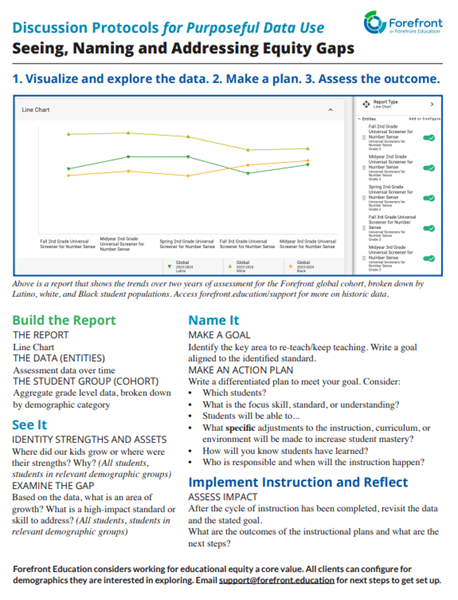
More from our blog
See all postsForefront is the only assessment data solution optimized for classroom assessment results, leveraging these results to fuel instruction, PLCs, and grading. Elevate meaningful assessment data district-wide to transform how you understand and communicate about student learning across your schools.
Copyright © 2025 Forefront Education, Inc. All Rights Reserved.



